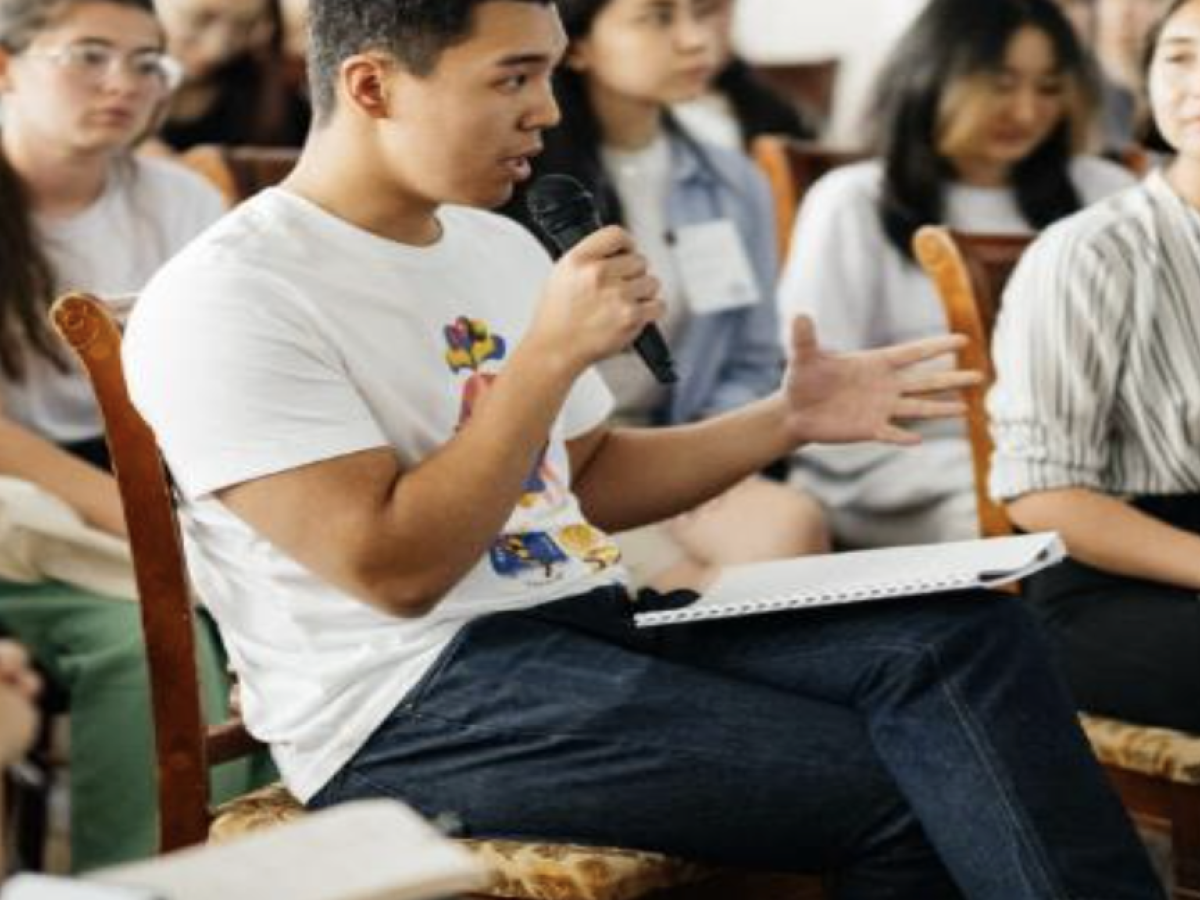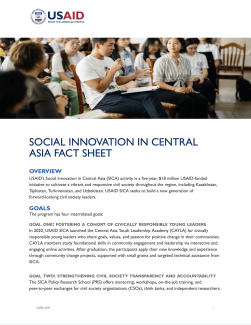OVERVIEW
USAID’s Social Innovation in Central Asia (SICA) activity is a five-year, $18 million USAID-funded initiative to cultivate a vibrant and responsive civil society throughout the region, including Kazakhstan, Tajikistan, Turkmenistan, and Uzbekistan. USAID SICA seeks to build a new generation of forward-looking civil society leaders.
GOALS
The program has four interrelated goals:
goal one: fostering a cohort of civically responsible young leaders
In 2020, USAID SICA launched the Central Asia Youth Leadership Academy (CAYLA) for civically responsible young leaders who share goals, values, and passion for positive change in their communities. CAYLA members study foundational skills in community engagement and leadership via interactive and engaging online activities. After graduation, the participants apply their new knowledge and experience through community change projects, supported with small grants and targeted technical assistance from SICA.
goal two: strengthening civil society transparency and accountability
The SICA Policy Research School (PRS) offers mentoring, workshops, on-the-job training, and peer-to-peer exchanges for civil society organizations (CSOs), think tanks, and independent researchers. This capacity building promotes participation in policy development and the role of watchdogs in monitoring the public sector. PRS engages its members in an advanced curriculum of budget advocacy and public procurement transparency. This curriculum is tailored to the highest priority policy areas of ongoing advocacy initiatives, future campaigns, and the budget process. SICA also awards grants (more than $850,000 to date) to support advocacy and research projects in Central Asia that strengthen civil society’s role in promoting transparency, public accountability, and policy research.
goal three: enhancing civil society’s ability to quickly respond to emerging opportunities
SICA is designed to provide civil society actors with the resources they need to strengthen their work and address the priorities of their communities. To allow civil society to identify where they see the greatest need for investment, SICA provides resources through ongoing, flexible grant competitions to solicit and support project ideas, promote positive citizen participation, and foster social innovations.
goal four: building the capacity of civil society organizations to be financially viable and responsive to constituents
To support an evidence-based approach for capacity building in Central Asia, SICA developed an Institutional Assessment Toolkit. This toolkit is used to conduct tailored assessments and provide training in targeted areas for growth. In 2021, SICA began offering Institutional Development Grants (average $15,000) to help CSOs address capacity gaps and better pursue their organizational missions.
In August 2023, SICA initiated a new program component entitled “Advocating for Disability-Inclusive Climate Action in Central Asia (ADCA)” across Kazakhstan, Tajikistan, Turkmenistan, and Uzbekistan. The goal of ADCA is to deepen the involvement of people with disabilities in formulating practical responses to climate change in Central Asia, including climate change mitigation efforts.
CUMULATIVE KEY RESULTS
- 357 civil society projects (totaling $5,160,550) providing innovative solutions to societal issues, addressing human rights and assisting vulnerable populations funded in Kazakhstan, Tajikistan, Turkmenistan, and Uzbekistan;
- As part of CAYLA, 480 young Central Asian civic leaders recruited to drive change and promote democracy principles in their communities;
- 78 members of the Policy Research School from Kazakhstan, Tajikistan, and Uzbekistan graduated and actively promoted public procurement transparency in their respective countries and published their project results in regional media outlets. Since 2020, SICA has awarded 38 grants (more than $850,000) to support advocacy and research projects in Central Asia that strengthen civil society’s role in promoting transparency, public accountability, and policy research;
- 121 Transparency Advocacy Organizations from Kazakhstan, Tajikistan, and Uzbekistan strengthened their capacity to conduct rigorous monitoring of the public sector, improved their performance as watchdogs and served as policy participants that offer constructive recommendations based on citizen input and sound data;
- 95 policies and practices improved by SICA grantees on municipal, regional and national levels based upon expert inputs and detailed analysis;
- 24 Civil Society Forums conducted among the interested NGOs and civic leaders (18 in Kazakhstan and 6 in Uzbekistan);
- 90 civil society organizations engaged as members of the Institutional Development Program to address capacity gaps and better pursue organizational missions;
- To date, SICA has supported 12 disability rights projects ($238,173) in Kazakhstan, Tajikistan, Turkmenistan, and Uzbekistan that deepen the involvement of persons with disabilities in formulating practical responses to climate change in Central Asia, including climate change mitigation;
- As of May 2024, SICA has awarded 78 grants ($399,037) to support youth leadership initiatives in Central Asia. Over the project lifetime, $2.2 million was obligated to solicit and support 143 timely project ideas and promote positive citizen participation and social innovations.
IMPLEMENTATION PERIOD: 2019 - 2024
BUDGET: $18 million
CONTACT: Madina Kusmoldanova, Democracy and Governance Office, USAID/Central Asia, mkusmoldanova@usaid.gov


